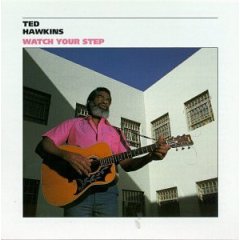Music |
Watch Your Step
Ted Hawkins
By
Published: Jan 01, 2006
Category:
Blues
A white, blonde blues singer from Beverly Hills — yes, it could happen. But you’d have a little trouble believing he knows about broken hearts and hard times. Ted Hawkins is something else. Even if he couldn’t sing, you only have to hear his life story to suspect he’s among the greats.
Consider: Hawkins was born in a small Mississippi town in 1936. He never knew his father. His mother was a prostitute. As a child, Ted was abused. He was expelled from grade school, send to reform school, and, at 15, jailed. His mother died of cirrhosis. He got married; his mother-in-law had it annulled. He married again; two months later, his wife died of cancer.
While bouncing in and out of jail, he discovered the guitar. Unsurprisingly, his style was raw — so raw that he had to wear a leather glove on his left hand to keep his fingers from bleeding. His lyrics were equally unvarnished:
Mama is dyin’ and daddy is gone
I’d call the doctor but there’s no telephone
Sister is cryin’ and the medicine is gone
We are the lost ones, livin’ all alone…
Or how about this cheerful refrain, from a song called “Sorry You’re Sick”:
What do you want from the liquor store?
Something sour or something sweet?
I’ll buy you all that your belly can hold
You can be sure you won’t suffer no more
Something tells me that the patient in this song is in no danger of getting better — and that Hawkins is getting the right medicine for her.
The song that certifies Hawkins for me as a major blues singer is called “Happy Hour.” You know: that late afternoon/early evening zone when drinks are cheap and you can — occasionally — set up the rest of the evening. His first chorus is benign:
Welcome to Happy Hour,
blinking on the neon sign
She won’t mind,
if I stop for just one
I can still make it home in time
But then Hawkins serves up an astonishing twist:
As my eyes grow accustomed
to the smokey dim lights
I see the juke box near the door
There she is,
in another man’s arms
slow dancing across the floor
That, friends, is the essence of the blues.
It would be sweet to report that when Ted Hawkins moved to Los Angeles in 1966 there was some interest in his music. There certainly could have been, for while white American musicians were tripping their brains out, Jimi Hendrix was starting to reinvent the blues. And in England, groups like Cream were re-recording classic black American blues.
Alas, it was not to be. Ted Hawkins spent decades as a busker, playing for donations on the boardwalk at Venice Beach. This did not provide an adequate income. Crime did. And so he spent more years in jail.
“Watch Your Step” is the first CD Ted Hawkins recorded that got any time of attention. Cult status followed, and more CDs. And then, just as major labels were sniffing around, he had a stroke and died. He was 58.
I love Ted Hawkins for the simple purity of his music. He plays a mean guitar, writes telling lyrics. But it’s his delivery that sets him apart — he’s not bitter or dark, not “showy” or “innovative.” What he has, in every song and in great abundance, is authenticity — his songs are so embedded in his life that his listeners are knocked by the facts of his existence. To say nothing of his rough and raspy sincerity.
Is Ted Hawkins a downer? Not at all. He looks directly at life and finds it…life. Good nights, bad nights, love and betrayal — you live them, you live through them, you go on. As a philosophy, that’s refreshing and bracing. As music, it’s pure joy.
To buy “Happy Hour” from Amazon.com, click here.


